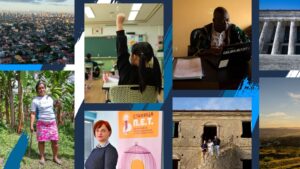Addressing Harmful Information Online
Enhancing Digital Civic Space through OGP
This blog is part of a series written with the International Centre for Not-for-Profit Law (ICNL). Read more about ensuring the internet and digital tools enable robust civic action and participation here.
Disinformation, online gender-based violenceReforms that combat gender-based violence are essential for fostering an inclusive society and government that respects human rights and promotes gender equality. Technical specifications: Commitments... More (GBV), and hate speech greatly impact online civic spaceAs online spaces for participation become increasingly popular, governments must work to ensure protection of basic rights — including the freedoms of expression, assembly, and association — in th... More and democratic processes. Disinformation increases polarization, influences electionsImproving transparency in elections and maintaining the independence of electoral commissions is vital for promoting trust in the electoral system, preventing electoral fraud, and upholding the democr... More, and fuels violence. Meanwhile, online GBV and hate speech discourage and prevent women, girls, LGBTQIA+Increasing opportunities for participation and creating accountability mechanisms for the LGBTQIA+ community in policy-making and service delivery can ensure that their voices are heard and changes ar... individuals, ethnic and religious minorities, and other communities from actively participating online. And yet, it is extremely difficult to accurately identify disinformation, hate speech, or misleading content. Some government responses to these harms have disproportionately curtailed freedom of expressionJournalists and activists are critical intermediaries connecting public officials with citizens and serving as government watchdogs, and their rights and safety need to be protected. Technical specifi... More. Governments should take steps to promote healthy and safe information ecosystems online while also protecting the exercise of online civic freedoms.
Recommended Open Government Commitments
- Revise relevant laws to address online GBV. These include revising relevant criminal statutes to authorize the investigation and prosecution of cyberstalking, online sexual harassment, online posts of non-consensual sexual images, and other forms of tech-facilitated gender-based violence. These revisions should avoid the use of vague or broad language that could include legitimate forms of expression, and criminal investigations and prosecutions pursuant to these provisions should follow appropriate due process standards. Law enforcement should be equipped to investigate these incidents using trauma-informed practices.
- Repeal or amend vague laws targeting harmful information online if the laws do not precisely identify a specific harm or are not narrowly tailored to address the harm. Vague and disproportionate laws that target online speech violate a State’s human rightsAn essential part of open government includes protecting the sacred freedoms and rights of all citizens, including the most vulnerable groups, and holding those who violate human rights accountable. T... obligations and lead to censorship of otherwise protected speech. Engage in a multi-stakeholder, consultative process to ensure any legal measures that restrict online speech are based on the State’s human rights and constitutional obligations and high-quality research about the harm, its impacts, and its pervasiveness.
- Enact targeted measures to increase transparency on online platforms to counter disinformation, such as “anti-bot” laws requiring automated online accounts to reveal their identities to users under certain circumstances, or laws mandating transparencyAccording to OGP’s Articles of Governance, transparency occurs when “government-held information (including on activities and decisions) is open, comprehensive, timely, freely available to the pub... More about the origins of online advertising or sponsored content.
- Invest in non-legal measures to counter harmful online content. This includes media literacy programs, curriculum development for schools on how to critically assess information and news, and support to women and vulnerable communities that are at greater risk of being targets for harmful content online.
- Publish regular reports on content takedown orders and requests issued or lodged by public authorities, including the number and type of requests and their rationale.
- Convene diverse stakeholders on creating healthy online ecosystems. These stakeholders should include digital platforms and other technology companies, civil society, academic experts, and representatives of communities frequently targeted by abusive online communications—to share information, identify research questions, and explore practices that can contribute to the development of healthy and safe online information ecosystems. Governments should also encourage platforms and other technology companies to invest in capacity buildingEnhancing the skills, abilities, and processes of public servants, civil society, and citizens is essential to achieving long-lasting results in opening government. Technical specifications: Set of ac..., reporting, and dialogue mechanisms that can foster the free exchange of information with civil society and the public, with the aim of promoting safe navigation of platforms and reducing the incidence of harmful information online.
- Engage with the public on legal protections for children online to review existing laws or bills related to protecting children online. Such engagement should help ensure that such laws are precise and narrowly tailored to protect children from online harms while avoiding infringement upon children’s right to freedom of expression. Governments should further invest in non-legal measures that engage and educate children and parents about risks online and mitigation measures they can take.
Positive Examples from OGP Action Plans and Beyond
- The state of São Paulo in Brazil has offered media literacy as an elective class for middle schoolers. The class includes lessons on how to responsibly use the internet and recognize trustworthy information.
- The Code of Practice on Disinformation is a voluntary initiative, undertaken based on guidance from the European Commission, under which 34 private sectorGovernments are working to open private sector practices as well — including through beneficial ownership transparency, open contracting, and regulating environmental standards. Technical specificat... More signatories committed to demonetizing disinformation, ensuring the transparency of political advertising, empowering users, enhancing the cooperation with fact-checkers, and providing researchers with better access to data.
- Finland developed a media literacy module that helps school-age individuals identify and distinguish amongst misinformation, disinformation, and mal-information.
- France committed to hosting multi-stakeholder dialogues with civil society and research institutions, to identify research priorities and existing tools, resources, and techniques to monitor and counter misinformation and disinformation. The government also committed to discussing proposed solutions to counter the dissemination of misinformation and disinformation.
- The Netherlands committed to introducing greater transparency into how political parties are funded while making online election campaigns and political advertisements more transparent, as a means of combatting disinformation.
- The state of California in the United States has enacted an “anti-bot law” that requires that bots (or the person controlling them) reveal their “artificial identity” when they are used to sell a product or influence a voter. The law defines a “bot” as “an automated online account where all or substantially all of the actions or posts of that account are not the result of a person.”
- In April 2019, six of Uruguay’s political parties signed an Ethical Pact Against Disinformation that pledged “not to generate or promote false news or disinformation campaigns to the detriment of political adversaries.” The Uruguayan Press Association proposed the pact as one of three prongs to combat disinformation, alongside fact-checking training sessions and training for media professionals.
Successfully addressing the threats posed by disinformation, online GBV and hate speech to democratic discourse requires carefully calibrated, rights-based, and multi-stakeholder approaches to regulation of online expression. Governments, working together with key actors like civil society and tech companies, can leverage open government principles to advance these approaches and protect democratic freedoms both online and off.
Download a PDF of this blog post here.
No comments yet
Related Content

Open Gov Guide
The Open Gov Guide is the go-to resource for officials, civil society representatives, and other actors looking for recommendations, examples, and resources on open government.

Digital Governance in OGP
OGP countries are leveraging the opportunities of evolving technology, such as artificial intelligence, data-driven algorithms, and mass social networks, while also developing policies to deal with the threats, including disinformation,…
 Uncategorized
Uncategorized Six Ways to Protect Democracy against Digital Threats in a Year of Elections
2024 has been dubbed the “year of elections”, with over four billion people expected to vote across more than 60 elections. This should be a cause for democratic celebration, but…


Leave a Reply